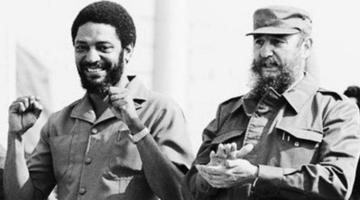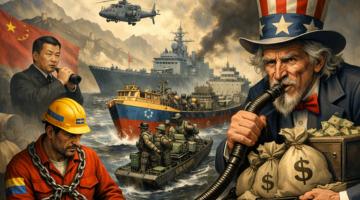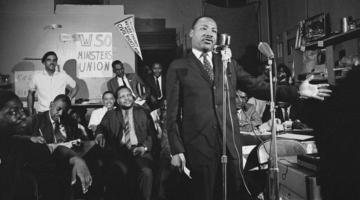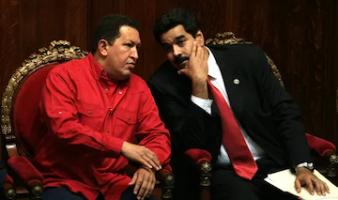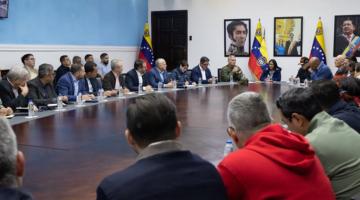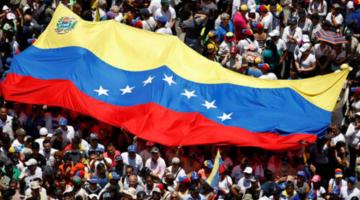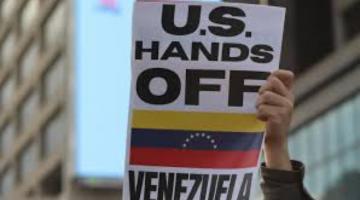Venezuelans went to the polls on May 25 to elect deputies for the National Assembly, as well as state governors and regional council legislators.
Roger D. Harris analyzes Western media's biased and dishonest coverage of Venezuela's May 25 election and the sweeping Chavismo victory.
Originally published in Venezuela Analysis.
The pro-government alliance achieved a sweeping victory in Venezuela’s May 25 elections, while a fractured opposition suffered losses. Western media distorted the results – spinning low turnout claims, ignoring the role of illegal US sanctions, and offering selective sympathy to elite opposition figures.
Opposition fractures, pro-government consolidates
At stake for the 54 contesting Venezuelan political parties were seats for 285 National Assembly deputies, 24 state governors, and 260 regional legislators.
The pro-government coalition won all but one of the governorships, taking three of the four states previously held by the opposition. The recapture of the state of Barinas was particularly symbolic for this was the birthplace of former President Hugo Chávez; and especially so, because the winner was Adán Chávez, the late president’s older brother.
Likewise, the Chavista alliance swept the National Assembly, securing 253 out of 285 seats. Notable exceptions were the election of opposition leaders Henrique Capriles and Henri Falcón, both of whom are former presidential candidates.
The New York Times reported the same outcomes but spun it as the “results [rather than the vote]…stripped the opposition of some of the last few positions it held,” inferring fraud.
However, this election outcome was not unexpected because the opposition was not only divided but a significant portion opted to boycott the vote. The pro-government forces enjoyed a unified effort, an efficient electoral machine, and grassroots support, especially from the communal movement.
“After 32 elections, amidst blockades, criminal sanctions, fascism and violence,” Venezuelan President Nicolás Maduro affirmed, “today we showed that the Bolivarian Revolution is stronger than ever.”
Opposition self-implodes
The headline from Le Monde spun the voting thus: “Venezuela holds divisive new elections.” Contrary to what the headline suggests, the divisiveness was not the government’s doing, but due to the opposition’s perennial internecine warfare.
While the pro-government Great Patriotic Pole alliance around the ruling Socialist Party (PSUV) “works in unison,” according to opposition leader Henrique Capriles, the electoral opposition divided into three warring camps. They in turn were surrounded by a circular firing squad of the far-right abstentionists, calling for a vote boycott.
The abstentionists were assembled around Maria Corina Machado. She had been pardoned for her involvement in the short-lived 2002 US-backed coup but was subsequently disqualified from running for office for constitutional offenses. Following Washington’s lead – which has not recognized a Venezuelan presidential election as legitimate since 2012 – the far-right opposition rejected electoral means for achieving regime change and has even pleaded in effect for US military intervention.
Machado’s faction, which claimed that Edmund González Urrutia won the 2024 presidential election, does not recognize their country’s constitutional authority. Consequently, when summoned by the Venezuela supreme court, they refused to present evidence that they won, removing any legal way for their claimed victory to be accepted. Machado maintained that voting only “legitimizes” the government, bitterly calling those participating in the democratic process “scorpions.”
Machado spent the election in self-imposed hiding. She further dug herself into a hole, after urging even harsher punishing US sanctions on her own people, by appearing to support Trump’s sending of Venezuelan migrants to the CECOT torture prison in El Salvador.
El Pais sympathized with her as “driven by the strength of the pain of being a mother who has been separated from her three children.” The WaPo described the middled-aged divorcé from one of the wealthiest families in Venezuela as a “courageous leader” whose “three children are exiled abroad.” In fact, her adult children live comfortably in the US and Colombia.
To this manufactured sympathy for the privileged, Venezuelan-Canadian sociologist Maria Paez Victor asks “where are the defenders of the human rights of Venezuelans?” She excoriates the collective West for their selective concern for human rights, emphasizing the neglect of Venezuelans’ rights amid external pressures and US sanctions.
The disputed Essequibo
The headline for The New York Times’s report spun the elections with: “Venezuela is holding an election for another country’s land.” This refers to elections for governor and legislators in the Essequibo (Guayana Esequiba in Spanish), which is in fact a disputed land.
For nearly two centuries, Venezuelans have considered that region part of their country, when they wrested it from the Spanish colonialists in 1835. In the questionable Paris Arbitral Award, with the US representing Venezuela, the Essequibo was handed over to the UK in 1899 (then colonial British Guiana and now independent Guyana). Ever since, it has been contested territory.
In 1962, Venezuela formally revived its claim at the UN, asserting that the 1899 award was null and void. Not surprisingly, the Times sides with Guyana or more precisely with what they report as “Exxon Mobil’s multibillion-dollar investments” plus “military ties with the US.”
This first-time vote for political representation in the Essequibo is seen by Venezuelans across their political spectrum as an important step to assert their claim. It follows a referendum in 2023, which affirmed popular support for the Essequibo as part of their national territory. The actual voting was held in the neighboring Bolivar state.
On cue, the western-aligned press criticized the vote on the Essequibo as a “cynical ploy” by the Maduro administration to divert attention from other pressing problems. Meanwhile, they obscure the increasing US military penetration in neighboring Guyana and in the wider region.
Yet even the NYT had to admit: “Claims to the Essequibo region are deeply ingrained among many Venezuelans… [and even] María Corina Machado, the most prominent opposition leader, visited the area by canoe in 2013 to advance Venezuela’s claim.” Venezuelan journalist Jésus Rodríguez Espinoza (pers. comm.) described the vote as “an exercise in national sovereignty.”
Illegal sanctions – the elephant in the room
A WaPo opinion piece claims, “that the actual root cause of poverty has been a lack of democracy and freedom,” as if the US and its allies have not imposed sanctions deliberately designed to cripple the Venezuelan economy. These “unilateral coercive measures,” condemned by the UN, are illegal under international law because they constitute collective punishment.
But the fact that Venezuelans had to vote while being subjected to illegal coercion is completely ignored by the corporate press. That is, the existence of sanctions are recognized but instead of exposing their illegal and coercive essence, the press normalizes them. The story untold by the press is the courage of the Venezuelan people who continue to support their government under such adverse conditions.
Disparaging the election
Washington and its aligned press cannot question the popular sweep for the Socialist Party’s alliance in Venezuela, because it is so obvious. Nonetheless, they disparage the mandate. The chorus of criticism alleges the fraudulent nature of previous elections, although it is a geopolitical reality that Washington considers any popular vote against its designated candidates illegitimate.
For this particular election, these State Department stenographers focused on the supposedly low turnout. In fact, the turnout was typical for a non-presidential election contest and in the same turnout percentage ballpark as US midterm elections.
Moreover, the pro-government slate, according to official figures, actually garnered more votes than it had in the previous regional elections. The Chavista core of older, working class women remains solid.
What was notably low was voting for the highly divided opposition, major factions of which called for a boycott. Further, the opposition had been discredited by revelations that some had received and misused hundreds of millions of dollars from USAID. More than ever, the inept opposition has negatively exposed itself to the broad electorate.
The overwhelming sentiment on the street in Venezuela is for an end to partisan conflict and for continuing the slow economic recovery. Challenges ahead include inflationary winds, a rising unofficial dollar exchange rate, and above all the animus of the Trump administration that is currently in internal debate over whether to try to deal the Bolivarian Revolution a quick or a slow death. Either way, destabilization efforts continue.
To which Socialist Party leader and Interior Minister Diosdado Cabello said: “No one can stop our people. Not sanctions, nor blockades, nor persecution – because when a people decide to be free, no one can stop them.”
Roger D. Harris is with the human rights organization Task Force on the Americas, the US Peace Council, and the Venezuela Solidarity Network.
The views expressed in this article are the authors’ own and do not necessarily reflect those of the Venezuelanalysis editorial staff.

